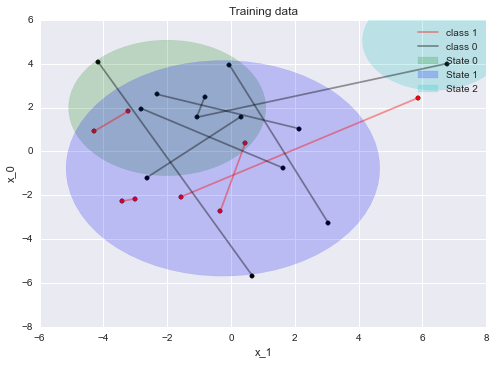A hidden (state) conditional random field (HCRF) written in Python and Cython.
This package is a fork of the original pyhcrf, written by
Dirko Coetsee, featuring Python 3 and Windows support
with a cleaner code base maintained by Martin Larralde.
pyhcrf implements a HCRF model with a sklearn-inspired
interface. The model classifies sequences according to a latent state sequence.
This package provides methods to learn parameters from example sequences and to
classify new sequences. See the paper
by Wang et al. and the report
by Dirko Coetsee.
Each state is numbered 0, 1, ..., num_states - 1. The state machine starts
in state 0 and ends in num_states - 1. Currently the state transitions are
constrained so that, on each element in the input sequence, the state machine
either stays in the current state or advances to a state represented by the
next number. This default can be changed by setting the transitions and
corresponding transition_parameters properties.
pyhcrf depends on numpy, scipy (for the LM-BFGS optimiser and scipy.sparse),
and also needs cython for building from source.
X = [array([[ 1. , -0.82683403, 2.48881337],
[ 1. , -1.07491808, 1.55848197],
[ 1. , 6.7814359 , 4.01074595]]),
array([[ 1. , -3.01165932, -2.15972362],
[ 1. , -3.41449473, -2.2668825 ]]),
array([[ 1. , -2.64921323, -1.20159641],
[ 1. , 0.31139394, 1.58841159]]),
array([[ 1. , 5.85226017, 2.43317499],
[ 1. , -1.57598266, -2.07585778]]),
array([[ 1. , -0.32999744, -2.70695361],
[ 1. , 0.44311988, 0.36400733]]),
array([[ 1. , -0.05301562, 3.95424435],
[ 1. , 3.04540498, -3.25040276]]),
array([[ 1. , -4.29117715, 0.9167861 ],
[ 1. , -3.22775884, 1.83277224]]),
array([[ 1. , -2.80856491, 1.95630489],
[ 1. , 1.62290542, -0.7457237 ]]),
array([[ 1. , -2.32682366, 2.60844469],
[ 1. , 2.12320609, 1.04483217]]),
array([[ 1. , -4.17616178, 4.09969658],
[ 1. , 0.67287935, -5.67652159]])]
y = [0, 1, 0, 1, 1, 0, 1, 0, 0, 0]>>> from pyhcrf import HCRF
>>> from sklearn.metrics import confusion_matrix
>>> model = HCRF(num_states=3, random_seed=3, optimizer_kwargs={'maxfun':200})
>>> model.fit(X, y)
>>> pred = model.predict(X)
>>> confusion_matrix(y, pred)
array([[12, 0],
[ 0, 8]])Download/clone and run
python setup.py build_ext --inplace
python setup.py install
The original code, and all contributions made subsequently in this fork, are licensed with BSD-2-Clause.











